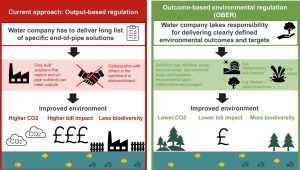AG INSIGHT | 04/05/2022
The government urgently needs to rethink its water strategy


[Image source: Frontier Economics]
As Ofwat finalises its proposal for setting water bills in the 2025-30 regulatory cycle, the water industry finds itself in a cleft stick. Industry and regulators alike face a combination of ongoing trust issues, heightened concerns about river pollution and the need to decarbonise one of the UK’s most energy intensive industries, while addressing growing environmental pressures on river catchments. All in the middle of a cost of living crisis.
We have seen this play out in recent policy debates: the final passage of the Environment Act through parliament was dominated by the Wellington amendment on storm overflows, supported by the water industry, exemplifying how our Victorian sewerage infrastructure has become a lightning rod for the public mood on river health.
Likewise, the government’s Strategic Policy Statement, giving direction to Ofwat on the Water Price Review in 2024 (PR24), was preoccupied with a kneejerk response to a simplistic message on storm overflows, in contrast to a more thoughtful consultation draft last summer.
There is a consensus between all actors, including the industry, that water companies must raise their game on environmental leadership. However, this will not, on its own, be enough to deliver the significant environmental improvements needed in the near term. We need to prevent harm from sources like storm overflows.
Action cannot stop with the water industry: the government must also end its policies that are making the problem worse, like allowing unflushable wipes that cause spill-triggering fatbergs, and the right of developers to add new drains to already overloaded sewers.
Crucially, the government must provide guidance to regulators so they can authorise new investment in sewers. To unlock the large amount of private investment needed to cut water pollution and restore nature, radical reform of regulation is needed.
By establishing a legally binding targets framework, the Environment Act has put some substance around the government’s commitment to improve the environment within a generation. But these targets need credible plans, architecture and mechanisms to finance and deliver them.
Defra’s proposed water quality targets are old school, output-based targets and fail the government’s own best practice criteria. Now, with the next price review, there is an unprecedented opportunity to establish, for the first time, an integrated strategy for improving the water environment, but the government needs to change tack quickly for 2025.
Current regulations stifle innovation
A report we commissioned from Frontier Economics, which has been independently peer reviewed by thought leaders and former regulators, demonstrates that we need a more efficient, outcome-based system of water regulation.
The government’s Strategic Policy Statement rightly puts its 25 year environment plan at the heart of its request for Ofwat to challenge water companies to be more ambitious on day to day environmental performance. However, current regulation will not support this because it is fragmented across different sectors, instead of based on systems thinking. River catchments are suffering from multiple market failures and yet, under existing regulation, different sectors contributing to the problem – water, agriculture, housing, highways – are not able to work together as they are subject to different rules, regulations and expectations.
Environmental regulation of the water industry is also incredibly prescriptive about methods to be used and is overly focused on specific actions instead of the end goal. Consequently, we often do not see the most efficient solution being chosen nor incentives for innovative solutions. Under the Water Industry National Environment Programme, the Environment Agency gives Wessex Water 1,000 outputs – largely asset upgrades – to deliver our environmental obligations. These asset-based solutions tend to be expensive, carbon intensive and use lots of chemicals. Because they are narrowly prescribed, there is also an opportunity cost of enabling water companies to work with others on solutions that deliver additional environmental benefits
A new approach should be tested
The climate and nature emergencies require a new approach where all parties work together to solve long term problems at a whole system level.
Regulators first need to set the outcomes they wish to see and by when. Then, set targets based on these. Finally, the water sector should be enabled to deliver the most efficient solutions with appropriate funding and incentive mechanisms. A strong, trusted monitoring framework needs to underpin the regime. Getting this right will tackle the severe ‘pinch points’ on the environment and on growth – including river pollution and nutrients – and be much more efficient than the current disjointed set of outputs, allowing investment to go further.
The 2024 Water Price Review is a chance to test out a new regulatory approach and encourage a step change in the environmental performance of the water industry.
The new orthodoxy on better regulation, emerging from the prime minister’s Taskforce on Innovation, Growth and Regulatory Reform and BEIS, emphasises the role of regulatory ‘sandboxes’ (where regulatory change is tested within a controlled environment, which policy makers are only just starting to apply to complex environmental challenges).
This could be applied to the water sector at PR24, without legislative change, with one important precondition: the Environment Agency should set water quality targets for companies as an outcome at a catchment scale. This would enable a company to make choices on the best way to deliver environmental obligations, whether through its supply chain, partnership working, nature-based solutions, market mechanisms or asset upgrades.
Behind this, Ofwat would need to level the incentives playing field for all delivery options and parties so that, for example, the current inherent bias towards funding hard infrastructure solutions is removed.
A tightly regulated sandbox could be a step towards a system that informs how to turn Environment Act targets into drivers of positive action and private investment across the economy.
It’s right to expect more from water companies
Campaigners are right to expect greater environmental leadership from water companies. The approach outlined here would enable faster progress to be made on the 25 year environment plan, lower private and social costs and facilitate private investment in environmental improvement.
It would tighten up the regulations and hold water companies to account through improved, trusted monitoring. Without this, we will not reveal data, learn lessons and discover how to deliver more environmental improvements with the lowest impact on water bills until 2030 at the earliest, by which time, we will be halfway through delivery of the 25 year environment plan.
Last summer, I warned that the window of opportunity for accelerating environmental leadership in the water industry at the next price review would be tight. It’s now nearly closed, so urgent action must be taken.



